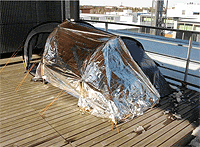HIIT study: Servers run well around zero degrees
 Lots of energy can be saved by using outside air directly for cooling in data centers in the north. In a study by researchers of Helsinki Institute for Information Technology HIIT and the University of Helsinki, computers functioned correctly over extended periods of time when run in harsh winter temperatures. Commercial, off-the-shelf computers ran well even when the outside temperature was -22C (-8F).
Lots of energy can be saved by using outside air directly for cooling in data centers in the north. In a study by researchers of Helsinki Institute for Information Technology HIIT and the University of Helsinki, computers functioned correctly over extended periods of time when run in harsh winter temperatures. Commercial, off-the-shelf computers ran well even when the outside temperature was -22C (-8F).
In the north, cooling data centers consumes lots of energy. According to an analysis published by HP in February 2009, data centers would be the sixth-largest consumer of electricity if they were classified as a separate industry. Research conducted in Helsinki Institute for Information Technology HIIT and the University of Helsinki aims at finding energy-saving potential in computing.
In the still on-going experiment by Professor Jussi Kangasharju and Researcher Mikko Pervilä servers have been kept running in a tent on a roof terrace in Finland for half a year. This is the first time computers have been run in a scientific experiment covering so wide a range of temperatures and humidity. Researchers follow how the servers run when temperatures and humidity changes naturally and the computers are only protected from direct snow, water and sunshine. When the outdoor temperatures have gone down to -22C (-8F), the temperature in the tent has been around -5C (+23F) because the computers heated up the tent.
- We are surprised at how well the servers have run compared to computers indoors. This means that data centers can be cooled in Northern Europe and Northern America with outside air efficiently without energy-consuming cooling and without computers functioning in a less stable manner due to changes in temperature and humidity, says Professor Kangasharju.
The study has been published in the Proceedings of the first ACM SIGCOMM workshop on Green networking.
Helsinki Institute for Information Technology HIIT is a joint research institute of Aalto University and the University of Helsinki for basic and applied research on information technology.
More information:
Jussi Kangasharju, professor
Helsinki Institute for Information Technology HIIT
Tel. +358 50 415 1708
e-mail: firstname.lastname@hiit.fi
Published article:
http://conferences.sigcomm.org/sigcomm/2010/papers/green/p9.pdf
Pictures about the experiments in Flickr:
http://www.flickr.com/photos/tags/runningserversaroundzerodegrees/
Presentation on the experiment held in Green Networking 2010:
http://www.cs.helsinki.fi/u/pervila/SIGCOMM2010/GreenNetworking_Presentation.pdf
